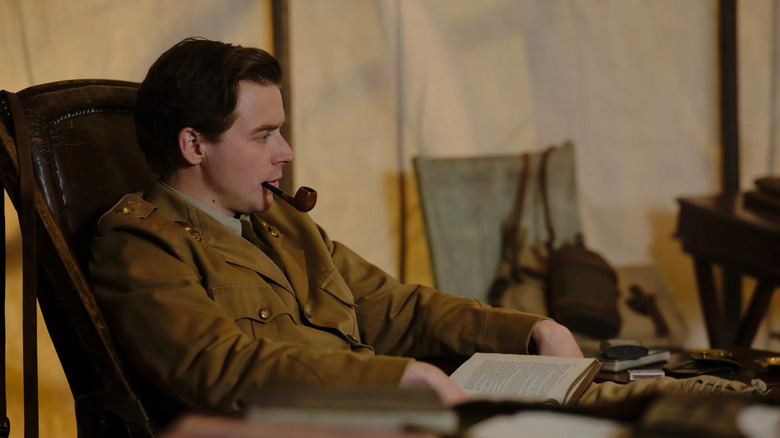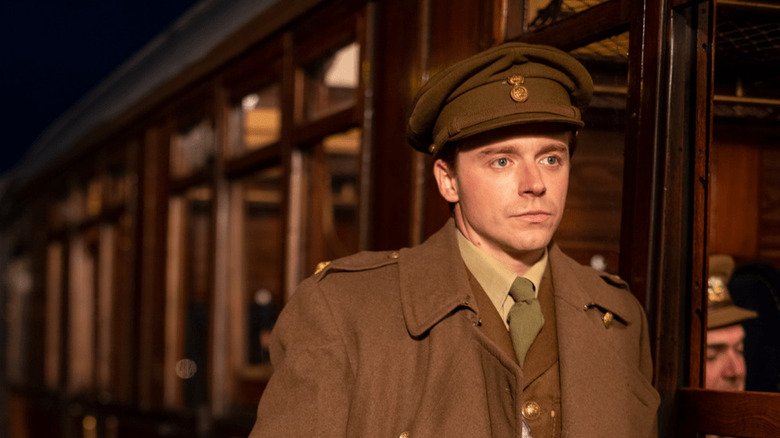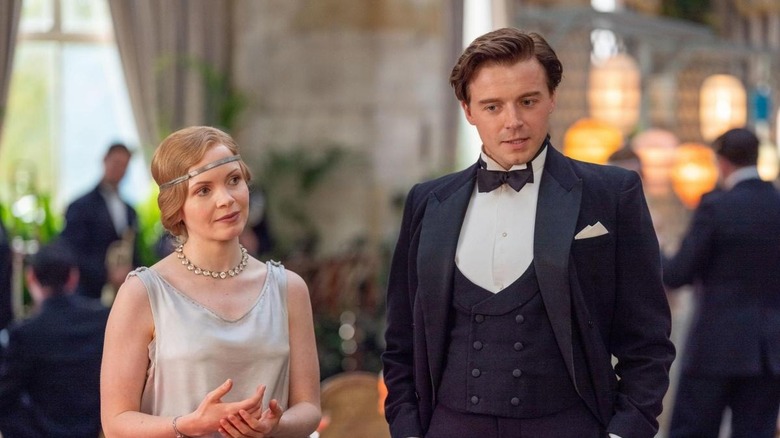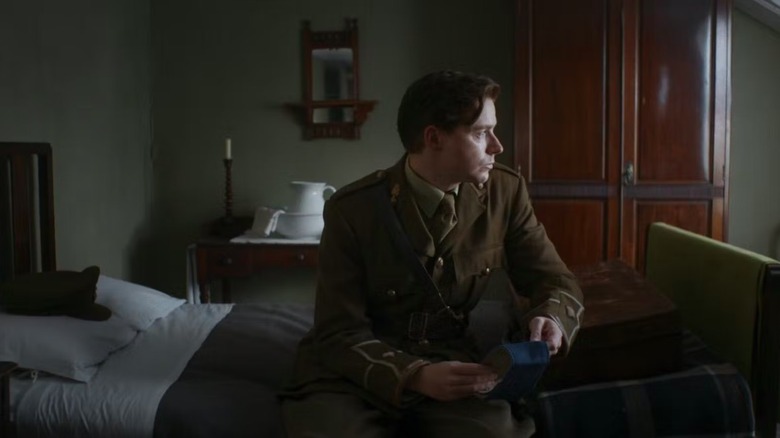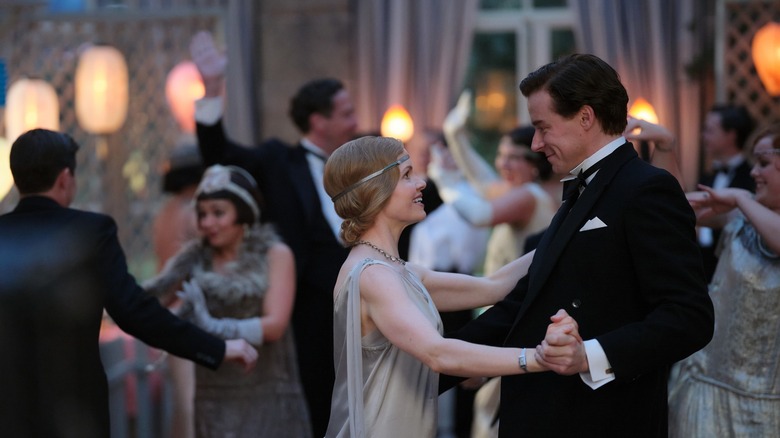Benediction Star Jack Lowden On Finding The Person Beneath The Anti-War Poet [Interview]
"Benediction" is a movie about an anti-war poet that never shows a single shot of war — at least, none that's filmed in the style of a typical somber war drama. Instead, "Benediction," a biopic about the influential Great War poet Siegfried Sassoon, relies on archival footage of World War I, which is interwoven throughout Terence Davies' film as Jack Lowden's Sassoon mournfully recites his poems. The result is an almost docudrama-style film, one that is half traditional biopic, half documentary that evokes the hopelessness of war.
It's an approach that would surprise many going into "Benediction" expecting a standard glossy biopic about a soldier who would go on to become a celebrated member of England's notorious Brightest Young Things socialite society. And it's one that partially surprised star Jack Lowden, who plays Sassoon as a young man (Peter Capaldi plays the poet as an older man), and was not fully aware of how Davies intended to frame the film's depiction of war.
"I didn't know that that's what we were going to do. I had no idea, obviously," Lowden told /Film in an interview ahead of the release of "Benediction." But this approach is what sets the film apart, Lowden thinks. "So many films do big trench scenes, and I don't think you can ever do enough of them obviously to be reminded about it. But to find archival footage is always going to be fantastic."
"[It's] a far more interesting way as well," Lowden added, "and just leaves more time to sort of spend with the man and the aftermath."
I chatted with Lowden about how "Benediction" undercuts our expectations of war dramas and the Bright Young Things society, and what it was like to play an LGBTQ icon.
'His regret plays a huge part in the film.'
You give an incredible performance here in Benediction as Siegfried Sassoon. When you got the part, how aware were you of Sassoon's works and how much research did you do before performing the part?
I first heard about him at high school when we studied the Great War poets, but I didn't learn too much about him. And then the next thing I heard about him was when I heard they were doing a film, and [was] sent the script and loved the script, auditioned for it, got the part. And, with a writer, obviously, there's a ton of material to research. So all of his poetry, his war diaries, everything. There's so much.
Can you describe your reaction upon reading Terence Davies' script for "Benediction"?
It's definitely still the best screenplay I've read. It's a beautiful piece of writing. It's a long script, but it's fantastic. I knew quite quickly that the part, the character, was a very special part, and I knew roughly what I could do with it and that I could do it. It was sort of in my wheelhouse. So yeah, it was wonderful to read it.
Can you speak about how it was in your wheelhouse? Which parts were you most comfortable or excited about really exploring when you read that script?
I think because he's an artist, because he works in the arts. So this sort of insecurity of being a performer, an artist, or whatever you want to call it. I obviously know exactly what that's like. And his regret, everybody's had regrets. His regret plays a huge part in the film. So, those kind of things in particular. I knew that obviously I'm not a First World War poet, I didn't fight in the war, I'm not English or whatever. So I knew that those were my ways into him. Yeah.
One of the integral parts of this film is how the horrors of war haunted survivors long after the war has finished, but the film notably never shows or even recreates any war scenes. What did you think of this particular choice with the film?
I think it was great. I think we've seen it before. So many films do big trench scenes, and I don't think you can ever do enough of them obviously to be reminded about it. But to find archival footage is always going to be fantastic.
I love a documentary as much as the next person. The world is obsessed with documentaries now, thanks to streamers. So I think it's a real, very, very cheap way, but also, which is great for an independent film, but a far more interesting way as well, and just leaves more time to sort of spend with the man and the aftermath.
'I was really proud of being in a film that tried to do it differently.'
The film plays loose with time and chronology at times, like you said, pulling from archival footage of the war for a near documentary feel while you narrate with Sassoon's poems. Because we jump through Sassoon's life through these sequences, what was going on in your head during these interludes? Did you pay particular attention to them perhaps as a way to better capture Sassoon's internal thoughts? Or were you just like, I just have to sit in a corner here and let this footage play?
No, I didn't know that that's what we were going to do. I had no idea, obviously. We recorded all of those voiceovers and poems before the first day of shooting. He does write in his script, Terence writes a lot of the camera moves, even down to the camera moves. He does do that, but there [were] some things that were left to surprise for when I saw it for the first time, which is always nice.
And what was your reaction upon seeing that and how the film interwove the footage with the things that you shot?
I thought it was really cool. Again, I just think, with any biographical film, there is a very, very recognized set way of telling a biographical film. And you see it quite a lot, particularly with artists, when it's a film about an artist and musician or whatever, and the formula, a lot of people follow that formula. A lot. And so this film didn't do that. It was a far more in-depth, far more sort of arty kind of way of doing it, so to speak. So I was really proud of being in a film that tried to do it differently, but that's all Terence, that's all Terence.
So Peter Capaldi plays Sassoon as an older man. Was there any collaboration between the two of you or observation of one another in order to maintain a consistency of the character, or did you decide to put your own separate individual spins on it?
We didn't meet until five or six weeks into the shoot where I basically shot all of my stuff. So there was no conversation at all. Terence doesn't even like to rehearse. So there was no conversation. So what Peter ended up doing was a complete surprise to me, and I think vice versa as well. But I think that helps serve the sort of gulf in the years that the film has that he's a different person by the end, literally. So I think it served it well.
'I think we run a risk of scaring young actors in particular.'
The notoriety of the Bright Young Things society is examined, explored, and undercut in "Benediction." What was it like being immersed in that era that was celebrated for its wealth and debauchery, but starring in a film that didn't explicitly celebrate it?
It was great. Like I say, again, we've seen those films, and I think [Terence has] taken the mick out of that quite a lot. And that quick-wittedness that they were also proud of, that Oscar Wilde kind of thing of quick quips. And I think Terence has taken the mickey out of it. But it's always lovely to ... because it's such a beautiful period of time, the 1920s, especially, it's a very classy looking, from our point of view. It's very cool. So any excuse to get tarted up and look like that for a bit is fun.
I saw that you recently spoke to The Telegraph about the right of any actor to play any role. Can you speak about playing a figure like Sassoon whose sexuality plays a major part in this film and whose sexuality is perhaps not of your own?
Well, it is one of these things that ... I think it's being asked a lot at the moment and I've been asked it a lot and I think, I don't want to become a sort of spokesperson for that subject because I don't think that's the responsibility of actors. I don't think, you know, we are actors. And I think we run a risk of scaring young actors in particular. I'm not that young anymore, but we run a risk of ruining and scaring young actors by trying to get them to answer very difficult questions that are never... the answers to which are never going to please everybody all the time.
So, yeah. I could go into it again, but I really don't want to. I just think, yeah, I don't want to become a spokesperson for it, but you know my views on it, and they're quite common, those views as well.
'If you go at something with pure, just your aim is relevance, the relevance can change.'
That's very fair. So what do you think it is, in your own words, that makes Siegfried Sassoon such a figure that still resonates today, even if his works were prominent, how long is it now? 80 years ago?
I think with the invasion of Ukraine and war in Europe again, it's so relevant to see, particularly when it comes to war, protest against war, an anti-war voice. He was one of the real first prominent public figures to do that. And I think it's quite an easy thing for us in the U.K. now to do, is to be anti-war. The same connotations aren't attached to it, the same risk is not attached to it, in the U.K. at least. So I think it's a great thing that people are reminded of when it was a crime essentially, or a thing of great shame to be anti-war in Britain.
So, I think it's a wonderful thing. Again, like I've said this before, is that you can't know that when you're making the film, that it could suddenly be incredibly relevant. And I think it's a sort of fool's errand to constantly be making films that are relevant, and I think when they're relevant by mistake, then they're made with the right reasons, first and foremost. They are made with a great passion for the subject or whatever it is. If you go at something with pure, just your aim is relevance, the relevance can change, for a start. So I'm very proud of the fact that the film can be useful at all. Because sometimes filmmaking doesn't feel useful.
Yeah. And the film too really puts his anti-war views at the forefront as opposed to how he might be remembered now for being a part of that Bright Young Things society. And it acknowledges both, but then it shows how they were both a major part of his persona and his character and his traumas and everything that was part of his life.
Yeah. On paper and on film, it seems like a really fun world to be in, in the groups and the circles that he moved in, the people that he knew. It makes you think of your own friends as incredibly boring, speaking for myself. I love my friends, but they're not Ivor Novello or Lawrence of Arabia. And so I'm incredibly jealous of him for the people that he got to spend time with and call friends. He went everywhere. He knew everyone, he went to every party. What a life he lived in many ways, but he lived a very, very tragic and tainted life at the same time.
So what would you say was the biggest challenge in portraying Siegfried Sassoon?
Doing the script justice. I think that the man had already had justice done by Terence's script. So really it became about serving the script and Terence's vision. That was the hardest part, because it's so perfectly written and it's just one view of a man's life. It should never claim to be ... definitive. So it was more about serving Terence and the script. That was the difficult part rather than serving Sassoon. Because that had already been done.
"Benediction" opens in theaters on June 3, 2022.
